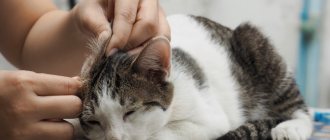How often?
If you are the proud owner of a kitten, then you have to clean the litter box more often. Why? Babies eat in relatively small portions, but often. Here's the result. An adult healthy cat relieves itself approximately once a day. Owners of “domestic” cats are a little more “lucky” in this regard: after all, you are the one who keeps the litter box clean. So you have the cards in your hands, if you wish, you will know exactly where, how much and how often. It's a little more difficult with street cats. There is only one way out - keep the animal in the house for several days.
Habit of marking territory
It is quite possible that frequent visits to the litter box are caused by a completely ordinary instinct that forces cats to mark their territory. This is also typical for some cats, who nevertheless behave more restrainedly and, instead of marking their owner’s things, simply often go to their litter box. Of course, all this is usually accompanied by a characteristic meow. This behavior can also often be seen in pregnant individuals.
If you are sure that the animal is not sick, there is no need to worry about this.
Why does a cat get constipated?
Constipation can be said to occur when an animal has bowel movements every other day or even two days. If you suspect something is wrong, you need to conduct your own research, checking the eating habits and preferences of your pet. Lifestyle also matters: lazy couch potato cats, as a rule, walk around less often than their more active relatives. Activity in purely domestic cats should be supported and even stimulated by offering them appropriate outdoor games and entertainment. Perhaps the pet's food is made from medium-strength wheat (filler), other grains (rice), and contains a lot of carbohydrates. We must not forget that cats are naturally carnivores; they need meat and animal protein. Be sure to check how much your family pet drinks. Lack of moisture almost inevitably leads to constipation.
As you can see, it is not at all necessary to drop everything and immediately run to the veterinarian. There are some things you can handle on your own.
Stress
Not only illness, but also stress can complicate the life of a furry couch potato. It can be caused by a variety of reasons:
- a recent visit to the veterinarian,
- a trip out of town,
- moving,
- meeting other animals while walking,
- changing the tray, bed or food,
- behavior of other domestic animals.
Stress has perhaps the most extensive list of “symptoms”. Because of it, the cat’s behavior can change dramatically: some animals can be overly active - they begin to meow, often go to the toilet, behave aggressively, hiss, while others, on the contrary, show signs of apathy - loss of appetite, reluctance to play.
A visit to the veterinarian is unlikely to help in this situation. No matter how strange it may sound, your pet just needs to be given psychological support: pay more attention to it, try to pick it up or just pet it. All this will help the cat calm down faster and return to a normal rhythm of life.
Why does a cat often walk in a big way?
We noted above: we consider going to the litter box once a day as a conditional norm. We make an exception for kittens, young and very active cats - they walk “big” more often. Pinch your nose with your hand again and inspect the excrement. They are “watery”, emit a nauseating odor, your cat has given up going to the litter box and now does her business wherever she has to - all these signs indicate the presence of certain problems.
First of all, as in the previous case, review your diet. Perhaps the key to the solution lies here. Make sure that your cat does not consume milk or milk-containing products (yogurt, etc.): many purrs suffer from individual lactose intolerance.
In most cases, diarrhea goes away within a day or two. If this is not your case, the diarrhea does not stop, there is blood in the stool, or you find worms or other parasites, do not delay a visit to the veterinarian.
Blood clot in the legs: the most common symptoms
15.10.2019
The formation of a blood clot in the deep veins of the lower extremities is a dangerous disease, as there is a risk of life-threatening complications. The thrombus can break away from the vascular wall, and the venous system reaches the heart and pulmonary artery - a pulmonary embolism occurs. When the pulmonary artery is completely blocked by a blood clot , sudden death occurs.
An increased risk deep vein thrombosis occurs in smokers, pregnant women, the elderly, patients with obesity , tumors, and blood .
What are the risk factors for developing a blood clot?
Factors contributing to the formation of a blood clot:
- dehydration;
- prolonged immobilization, such as air travel;
- presence of varicose veins ;
- pregnancy ; injuries, operations ;
- blood disorders ;
- medicines - contraceptives;
- obesity.
There are three main mechanisms for the formation of blood clots:
- damage to the wall of a blood vessel . If there is damage to the vascular wall (rupture, trauma, tingling), adrenaline, norepinephrine and serotonin are released, causing vasospasm . Platelets, and then white and red blood cells cling to the lesion - a blood clot ;
- venous sagging - delayed blood flow and congestion in large vessels favor thrombosis ;
- increased blood - Increased blood occurs during injuries, surgeries, tumors, burns, and dehydration.
What are the symptoms of a thrombus (blood clot) in the veins of the lower extremities?
At an early stage, when the blood clot is small and does not completely block the lumen of the affected vein , there is no inflammation and symptoms may be absent.
Here are some classic symptoms you may experience with a blood clot in your legs:
- spontaneous pain. In some cases there may be little pain, such as heaviness or discomfort, and in other cases there may be quite a lot of pain. In an upright position, the pain intensifies;
- painful pain in the course of large vessels ;
- pain in the groin of large vessels occurs in the area of the inguinal fold, in the buttock, inside the thigh;
- provoked pain. Pain occurs in the following cases: in the dorsiflexion of the foot pain is provoked, in the lower part of the leg - due to the release of the tibial veins ; coughing and sneezing cause pain in the corresponding limb;
- swelling. Painful swelling in the area of the clot - ankle, lower leg . It is typical for the swelling to not go away with cold compresses and may be enlarged for no apparent reason;
- change in skin color. The skin turns red and then turns blue-gray. The appearance of red spots on the skin in the area of the clot is a characteristic sign of the formation of a blood clot in the deep veins . These spots do not disappear over time, but become larger;
- warming of the skin. Increased skin temperature in the area of the blood clot is a relatively early sign. Warm skin may be accompanied by other symptoms such as itching, throbbing;
- dilated superficial veins - dilated veins around the ankle, lower leg, at the base of the thigh dilate;
- general symptoms are increased heart rate, fever, dizziness , anxiety.
Published in Phlebology Premium Clinic
Strong smell
Why does cat poop smell so strong? Everyone has heard about the extraordinary odor of cat feces, even those who are far from the animal world. There is only one explanation: purrs attach paramount importance to various odors. Your pussy leaves its scent marks everywhere. And when it rubs against its owner’s legs, and when it “butts” its head. Cats leave a unique smell everywhere, including on furniture and household items.
By the way, they are well aware of the specific aroma of their feces. Therefore, most cats try to bury (hide) them deeper and further away, so as not to attract the attention of large predators. However, there are also so-called “alpha”, or dominant cats. They display the products of their vital activity - they say, admire and smell. It’s a curious detail, but excrement contains a lot of useful and “educational” information. Japanese scientists say that whiskers “encrypt” even information about their own owners in feces. By the smell you can determine who left the “gift” - a cat or a female cat, what age it is, what food preferences are, what individual preferences are. However, you and I, no matter how hard we try, will not understand anything. Let’s just note one important thing: the smell has become too strong and intolerable - it’s better to show your pet to a veterinarian. Such a visit becomes a necessity when the animal suffers from chronic constipation or, conversely, incessant diarrhea. The final diagnosis of your pet will be made exclusively by a specialist.
Original publication: How Often Do Cats Poop? Author: Reyna Abraham. Source: cuteness.com Photo: pixabay.com











